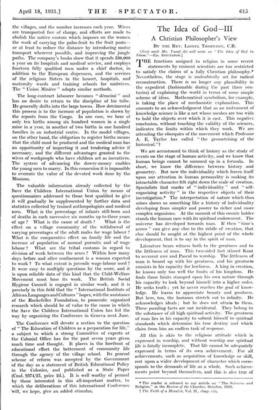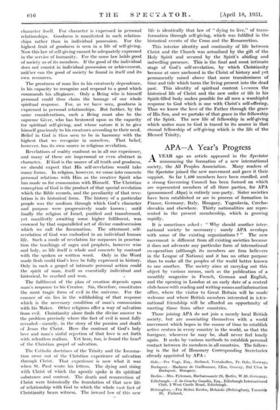The Idea of God—III
A. Christian Philosopher's View
BY TILE REV. LIONEL THORNTON, C.R.
Wert week Mr. Yusuf All will write on " The Idea of God iU Islam."—ED. SPECTATOR.] THE functions assigned to religion in some recent statements .by eminent scientists are too restricted to satisfy- the .claims of a fully Christian philosophy.* Nevertheless, the stage is undoubtedly set for radical reconstruction. There is no longer any plausibility in the expedient (fashionable during the past three cen- turies) of explaining the world in terms of some simple scheme of ideas. Mathematical symbolism, for example, is taking the place of mechanistic explanation. This amounts to an .acknowledgment that as an instrument of knowledge science is like a net whose meshes. are too wide to hold the objects over which it is cast. This negative conclusion, without touching the validity of the sciences, indicates the limits within which they work. We are attending the obsequies of the movement which Professor A. E. .Taylor. has called " the geometrising of the historical." 't We are accustomed to. think of history as the .study of events _on the stage of human activity, and we know that human beings cannot . be summed up in a formula. In short,. we know the . difference. between history :and geometry. But now the individuality which. forces itself upon our attention in human personality is making its intractable character felt right down the scale of creation. Specialists find marks of " individuality." and . " self- organizing activity " in the respective objects of their investigation.* The interpretation of nature which thus arises shows us something like a history of individuality developing from simpler and poorer to richer and more complex organisms. At the summit of this cosmic ladder stands the human race with its spiritual endowment. The universe has developed towards man. If then "time's arrow " can give any clue to the riddle of creation, that clue should be sought at the highest point of the whole development, that is to say in the spirit of man.
Literature bears witness both to the greatness and to the littleness of man. This two-sided fact stirred Kant to reverent awe and Pascal to worship. The littleness of man is bound up with his greatness, and his greatness consists in his capacity for lowliness. A king in creation, he knows only too well the limits of his kingdom. He finds those limits stamped upon his own nature through his capacity to look beyond himself into a higher order. He seeks truth ; yet he never reaches the goal of know- ledge. He learns to appreciate beauty and goodness. But here, too, the horizons stretch out to infinity. He acknowledges ideals ; but he does not attain to them. These puzzling facts are not incidental. They belong to the substance of all high spiritual activity. The greatness of man lies in his capacity to submit himself to spiritual standards which determine his true destiny and which claim from him an endless task of. response.
All this is akin to the religious attitude which is expressed in worship, and without worship our spiritual life is fatally incomplete. That life cannot be adequately expressed in terms of its own achievement. For all achievements, such as -acquisition of knowledge or skill, rest upon a wider development of character which corre- sponds to the demands of life as a whole. Such achieve- ments point beyond themselves, and this is also true of * The reader is referred to my article on " The Sciences and Religion," in the Review of the Churches, October, 1929.
t The Faith of a Moralist, Vol. II., chap. character itself. For character is expressed in personal relationships. Goodness is manifested in such relation- ships rather than in individual possession. For the highest fruit of goodness is seen in a life of self-giving. Now this law of self-giving cannot be adequately expressed in the service of humanity. For the same law holds good of society as of its members. If the good of the individual does not consist in individual possession. or achievement, neither can the good of society be found in itself and its own resources.
The greatness of man lies in his creaturely dependence, in his capacity to recognize and respond to a good which commands his allegiance. Only a Being who is himself personal could thus claim the homage of our whole spiritual response. For, as we have seen, goodness is expressed in personal relationships. But further, by the same considerations, such a Being must also be the supreme Giver, who has bestowed upon us the capacity for spiritual self-giving, and whose nature it is to give himself graciously to his creatures according to their need.. Belief in God is thus seen to be in harmony with the highest that we recognize in ourselves. That belief,- however, has its own source in religious revelation.
Revelations of reality confront us in all our experience, and many of these are impersonal or even abstract in character. If God is the source of all truth and goodness, we should expect that His self-revelation would take many forms. In religion, however, we come into concrete personal relations -with Him as the creative Spirit who has made us for communion with Himself. The Christian conception of God is the product of that special revelation which the Bible records, and the peculiarity of that reve- lation is its historical form. The history of a particular people was the medium through which God's character and purpose were progressively made known ; until finally the religion of Israel, purified and transformed, yet manifestly awaiting some . higher fulfilment, was crowned by that unparalleled act of divine condescension which we call the Incarnation. The uttermost , self- revelation of God was embodied in an individual human life. Such a mode of revelation far surpasses in penetra- tion the teachings of sages and prophets, however wise and holy, as life itself is whole and concrete by contrast with the spoken or written word. Only in the Word made flesh could God's love be fully expressed in history. Only in such a gospel of intimate personal action could the spirit of man, itself so essentially individual and historical, be reached and won.
The fulfilment of the plan of creation depends upon man's response to his Creator. Sin, therefore, constitutes the most tragic form of evil in the universe. For the essence of sin lies in the withholding of that response which is the necessary condition of man's communion with his Maker. Other religions offer a way of salvation from evil. Christianity alone finds the divine answer to the problem precisely where the fact of evil is most fully revealed—namely, in the story of the passion and death of Jesus the Christ. Here the contrast of God's holy love and man's sinful rejection of that love is set forth with relentless realism. Yet here, too, is found the heart of the Christian gospel of salvation.
The Catholic doctrines of the Trinity and the Incarna- tion arose out of the Christian experience of salvation through Christ. That experience is now what it was when St. Paul wrote his letters. The dying and rising with Christ of which the apostle spoke is its spiritual substance and content. The death and resurrection of Christ were historically the foundation of that new life of relationship with God to which the whole vast fact of Christianity bears witness. The inward law of this. new life is identically that law of " dying to live," of trans- formation through self-giving, which was fulfilled in the historical events of the Cross and the Resurrection.
This interior identity and continuity of life between Christ and the Church was actualized by the gift of the Holy Spirit and secured by the Spirit's abiding and indwelling presence. This is the final and most intimate stage of God's self-revelation, by which Christianity became at once anchored in the Christ of history and yet permanently raised above that mere transitoriness of time and tide which turns the living present into the dead past. This identity of spiritual content Lerween the historical life of Christ and the new order of life in his Spirit-filled body makes possible for all men a worshipful response to God which is one with Christ's self-offering. Thus we know the love of the Father through the grace of His Son, and we partake of that grace in the fellowship of the Spirit. The new life of fellowship in self-giving which unites man to God is traced to its source in that eternal fellowship of self-giving which- is the life of the Blessed Trinity,















































 Previous page
Previous page